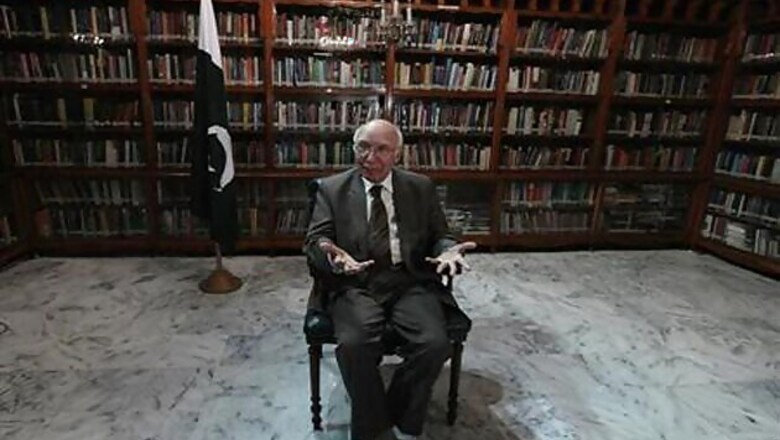
views
Pakistan plans to free former Afghan Taliban second-in-command, Mullah Abdul Ghani Baradar, this month to help advance peace efforts in neighbouring Afghanistan, Pakistan's foreign policy chief said on Tuesday.
The United States and Afghanistan have long pressed Pakistan to free Baradar and other senior Taliban figures who could be used to tempt moderate Taliban leaders to the negotiating table and transform the insurgency into a political movement.
"In principle, we have agreed to release him. The timing is being discussed. It should be very soon ... I think within this month," Sartaj Aziz, Pakistani Prime Minister Nawaz Sharif's adviser on foreign affairs, told Reuters in an interview.
Baradar's fate is at the heart of Afghanistan's efforts to kick-start the stalled peace process as most NATO combat troops prepare to pull out of Afghanistan by the end of 2014 and anxiety grows over the country's security.
Afghan President Hamid Karzai has spent years calling for his release because he believes Baradar is more open to dialogue than many of his comrades.
Until being captured in Pakistan in 2010, Baradar was a close friend of the group's reclusive leader, Mullah Mohammad Omar who gave him his nom de guerre, "Baradar" or "brother".
He was also the main day-to-day commander responsible for leading the Taliban campaign against US and NATO troops, plotting suicide bombings and other attacks.
Afghans hope he could act as a go-between with Taliban leaders including Omar but some have doubts over how much clout Baradar still has in the Taliban circles, and indeed how keen he would be to promote peace.
Aziz said, however, that Baradar would not be handed over to Afghanistan directly as some in Kabul had hoped, and would instead be released into Pakistan.
He said it was important to make sure the released Taliban prisoners had a chance to establish contact with their leadership on the ground to persuade them to be part of peace talks - an idea he said Karzai had agreed to.
"Obviously Karzai wanted him to go to Afghanistan, but we feel that if they are to play a positive role in the reconciliation process then they must do it according to what their own Shura (Council), their own leadership, wants them to do," Aziz said.
"That they can't do unless they are released. ... I think he (Karzai) accepted this point that they should play a constructive role in the peace process."
Afghanistan welcomed the move but urged Pakistan to keep a close eye on his moments.
"Pakistan's position is not to release him to Afghanistan and to keep him Pakistan," said Karzai's spokesman Aimal Faizi.
"But our position is that Mullah Baradar must be accessible, secure, with a known address and he must be in the service of the Afghan peace process."
Taliban spokesman Zabihullah Mujahid told Reuters: "We hope that his imprisonment is over".
MONITORING TALIBAN MOVEMENTS
Pakistan is key to the fate of US and Afghan efforts to bring stability to Afghanistan, a challenge gaining urgency as the end of the US combat mission in 2014 draws closer.
Its long-running refusal to hand Baradar over to Afghanistan has been one of the biggest obstacles to peace talks, allowing mutual suspicions to hamper efforts in one of the world's most explosive regions.
Aziz's remarks followed last month's trip by Karzai to Pakistan, where he sought the handover of some Afghan insurgents as part of the stalled peace process.
On Saturday, Pakistan freed a group of Taliban in an attempt to improve its troubled relations with Afghanistan, but once again risked angering Kabul by not handing them over directly.
Afghanistan fears that Pakistan is only pretending to support dialogue while its intelligence agencies harbour Taliban leaders to project influence across their shared frontier.
It is also concerned the released Taliban would simply go back to the tribal areas and rejoin the insurgency.
Aziz said that was not going to happen, adding that allowing them to establish contacts with their leaders would give more credibility to attempts to revive peace talks.
"We monitor their movements and watch where they go," he said. "We have to allow these released detainees to establish contact with their Shura and then decide where to go."
He said the Pakistan government was keen to use its contacts with insurgent groups to prepare the ground for peace talks but said it was up to Afghanistan to come up with solutions.
"We have influence on some groups and we use them. But obviously as you know even in the best of times in the past they listened to us only when they wanted to ... They are very independent minded," he said.
"I think our basic purpose is to persuade them to talk to Afghans. We can't speak on their behalf. We have no solutions to suggest, formulas to suggest. We just want to bring them together."




















Comments
0 comment